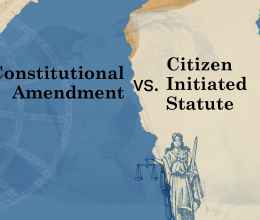Between the COVID pandemic, the Black Lives Matter revolution, and the 2020 General Election (and the ensuing drama afterwards), 2020 has been quite the year! And that’s not even mentioning the multitude of other things that have happened, such as the heartbreaking loss of Supreme Court Justice Ruth Bader Ginsburg. This is exactly why so many of us are looking forward to 2021 as a year to finally rest and recuperate from the exhausting things we’ve gone through this year. But we’re here to tell you: get ready for 2021! The ACLU of Ohio staff, board, and volunteers are nowhere near putting our feet up in 2021. In fact, here are the things we are looking forward to in 2021 – and you should be too!
- Reforming Ohio’s Broken Cash Bail System:
We’ve said this over and over: cash bail creates a two-tiered system of justice in which people who can afford their freedom go home to their families, and those who cannot – despite not being convicted – are forced to suffer in jail. In Ohio in particular, there are as many as 12,000 people held pre-trial on any given day! This, without a doubt, causes devastating ripple effects for every single one of us in this state; in fact, studies show that just 72 hours in jail pretrial can cause individuals to lose their job, their housing, and even custody of their children.
In early fall of 2020, the ACLU of Ohio released a fiscal impact report on bail reform in Ohio. The findings were astronomical, revealing that if Ohio adopted common sense bail reform, our state could save a whopping $199-$264 million per year. Let’s read that again. That’s $199-$264 MILLION PER YEAR. In this report, we ultimately found that holding people in jail unnecessarily does not promote public safety, is not fiscally responsible for any of us, and is expensive for the state and the individual.
Wealth should never determine anyone’s freedom, and we unnecessarily harm our neighbors and ourselves every day that we let wealth-based detention continue. Important to also note is that the current system disproportionately punishes and targets Black people and other people of color as well as people from economically disadvantaged communities. This is not justice!
In the end, what does this all mean? Ohio needs statewide and local bail reforms so every single Ohioan can benefit in a multitude of different ways. Our recommendations are simple: create a release valve for everyone, much like the one that currently exists only for the wealthy. Instead of resources determining someone’s freedom, we propose that most people go home on the same day as their arrest, and for those who pose a flight risk or a threat to a specific person, a conditions of release or detention hearing should be held within 48 hours.
And if you want to take action on this now, why not send a quick message to your state lawmakers, urging them save Ohio big money with real bail reform? Remember, we can’t end mass incarceration without ending the bail system as we know it.
- Repealing the Death Penalty:
Simply put, the death penalty is not justice! The ACLU believes the death penalty inherently violates the constitutional ban against cruel and unusual punishment and the guarantees of due process of law and of equal protection under the law. Like the unjust bail system, the death penalty is applied in an unfair and unjust manner against people and is largely dependent on race and how much money is involved. For instance, people of color are far more likely to be executed than white people, especially if the victim is white. And the similarities don’t end there – like bail reform, the death penalty unnecessarily uses taxpayer funds (costing approximately $16 million per case!) and does not provide any additional safety to the general public. Additionally, innocent people are too often sentenced to death.
Since 1973, over 156 people have been released from death row in 26 states after they were found innocent. Of those, Ohio is home to nine death row exonerees who collectively spent 190 years in prison for crimes they didn’t commit. For every six people the state of Ohio has executed, one person has been found innocent. This kind of mistake is far too frequent when human lives are at stake. In early December of 2020, the Ohio General Assembly passed HB 136, a law that prohibits the executions of killers who have ‘serious mental illness.’ This is worth celebrating, but in 2021, Ohio should take the next step and fully repeal the death penalty.
22 other states have banned capital punishment – Ohio can and should be the next.
- Serving as Redistricting Watchdogs & Pushing for Electoral Reforms:
The sad fact of the matter is that Ohio has one of the most egregious examples of partisan gerrymandering in modern history. In 2018 we filed a lawsuit in federal court challenging Ohio’s U.S. Congressional District Map as unconstitutional. Although we won in district court, a SCOTUS decision later that summer ruled that partisan gerrymandering is beyond the reach of federal courts; unfortunately, this made our case moot.
The story of how and why Ohio’s U.S. Congressional Map became so gerrymandered goes back to ten years ago. In 2010, Ohio Republicans succeeded in securing single-party control of the state and quickly got to work on drawing a map that would deliver favorable results for the next 10 years. And this map worked exactly as it intended to – the GOP consistently maintains a 12-4 hold on Ohio even when they only get around half the vote. That means they hold approximately 75% of the seats in the Ohio Statehouse in what is one of the most lopsided supermajorities in the nation. And nothing is more dangerous than a supermajority like this.
Every ten years, after the U.S. Census is conducted, states redraw their maps. When the map is to be redrawn in 2021, we WILL be watching closely, and we WILL make sure that everyone knows exactly what is going on. Partisan gerrymandering deprives voters of the opportunity to cast a “meaningful ballot” – a substantial burden on the constitutional right to vote – and violates a voters’ 14th Amendment right to equal protection and treatment under the law.
Going hand-in-hand with this is the need for more electoral reform. At the very least, we must require more drop boxes and vote centers. When there is literally only one box/location to drop off an absentee ballot and/or vote early in person in counties with millions of voters, there are obstacles created that can hinder a voter from casting their ballot. Just this past election, people waited for hours in long lines during the early voting period, vendors were overwhelmed with absentee ballot mailings, and a disorganized voter registration system forced tens of thousands of Ohioans to cast provisional ballots.
Additionally, it is common sense to create an online absentee request portal to make access to absentee voting more accessible. However, the best way to grant Ohioans the most accessibility is automatic voter registration (AVR) and same day voter registration (SDR). While automatic voter registration clears certain hurdles that may limit access to one’s attempts to register to vote, SDR is the crown jewel that could make most hurdles virtually nonexistent. SDR accomplishes many things – it increases voter turnout, eliminates arbitrary registration deadlines, helps maintain accurate voter lists, and acts as a failsafe for younger, poorer, and more transient populations that historically have been cut out of our democratic process. And contrary to the narrative that this can lead to election fraud, states with SDR are shining examples of how SDR do not compromise election integrity.
Here’s the thing: despite all of our work towards bail reform, repealing the bail reform, fighting for secure and fair elections, and the myriad of lawsuits we are currently undertaking defending constitutional rights of various Ohioans, the ACLU of Ohio needs you. Make sure sign up for our Action Team, and follow us on Twitter, Instagram, and Facebook to be up-to-date on the latest news and calls to action so that we can keep moving towards a stronger and better Ohio that reflects all of us.







